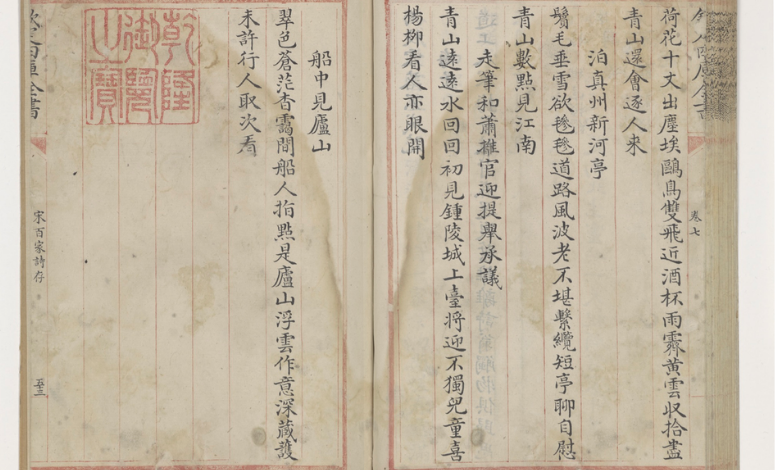
This week, Alibaba launched an incubator with BMW Startup Garage China, empowering tech startups to scale up their innovations. We also look at DAMO Academy’s latest project to digitize ancient Chinese books using advanced Optical Character Recognition technology, as well as how luxury brands celebrated China’s 520 Day and Cainiao’s new direct cargo flight between China and Hungary.
Sign up for our newsletter to receive the latest Alibaba updates in your inbox every week.
Alibaba to Digitize Ancient Books with AI Technology
DAMO Academy, Alibaba’s global research arm, has started a new project to digitize Chinese classics in collaboration with partners, including the UC Berkeley Library, Sichuan University, National Library of China and Zhejiang Library. They aim to convert scanned images from ancient Chinese books into texts for readers online. The project requires a more delicate technology than it sounds, as old Chinese characters are complex, with different variants and written forms. To increase accuracy, DAMO plans to use optical character recognition (OCR) technology and is teaming up with researchers at Sichuan University to develop an artificial-intelligence model for single-character indexing and automatic character grouping, as well as machine-learning technologies, such as self-supervised learning. “We believe that technology can play a critical role in preserving precious cultural relics and heritage, and we look forward to working with libraries in China and abroad to make this happen,” said Jeff Zhang, head of Alibaba DAMO Academy.
Alibaba Cloud and BMW Launch Joint Innovation Base in Shanghai
On Thursday, Alibaba’s cloud-computing unit and BMW Startup Garage China announced the opening of a new startup incubator in Shanghai. The companies will scout high-potential startups in the auto industry to co-innovate with BMW Group on cutting-edge technologies. More than 20 startups, covering strategic innovation fields such as digitization, electrification and sustainability, have already set up their offices in the incubator. The joint innovation base marks BMW’s latest effort to accelerate digital transformation with Alibaba. In October 2020, the two signed a Memorandum of Understanding to collaborate in branding, marketing, end-to-end operations and information technology, as well as to further digitize its business.
IKEA Expands Delivery Service on Tmall Ahead of 6.18
Ahead of the 6.18 Mid-Year Shopping Festival, Swedish furniture retailer IKEA said its virtual store on Alibaba’s B2C online marketplace will soon support deliveries to Chinese consumers nationwide. IKEA launched a Tmall store last March, piloting its delivery service in select locations including Shanghai, Zhejiang, Jiangsu and Anhui. Over the past year, IKEA’s flagship attracted more than 2.76 million followers and over 100 million visitors. It’s also tapped Tmall’s advanced New Retail technologies – from livestreaming and online-to-offline membership solutions to 3D shopping features that replicate the experience of physically shopping in one of its signature maze-like stores.
Cainiao Launches First Cargo Flight Linking Hungary and China
Alibaba’s logistics arm Cainiao Network has recently launched its first direct cargo flight between the China’s Zhengzhou and Budapest in Hungary to meet the increasing demand for e-commerce goods in the eastern European region. Cainiao will operate a five-weekly flight, transporting up to 17 tons of goods per day. Separately, Cainiao’s digitized customs clearance system has helped shorten the average offline clearance time of 1-2 days to 6 hours, completing the clearance process even before the flight lands. In the first quarter of this year, the trade volume between China and 17 central and eastern European countries reached US$30.13 billion with a year-on-year increase of 50.2% – 11% higher than the growth rate of China’s foreign trade in the same period, according to government data.
Luxury Brands Tap Tmall to Celebrate China’s 520 Valentine’s Day
This week, luxury brands went all out with cross-collaborations and campaigns on May 20 – an unofficial Valentine’s Day that grew out of China’s unique cyberculture (“520” when pronounced in Mandarin sounds close to “I love you”). Tmall’s luxury division launched a series of shoppable, multimedia content with Elle Magazine, including a livestream program that featured the popular livestream host Viya Huang. Swiss jewelry brand and watchmaker Piaget also made use of Alibaba’s livestreaming technology for a 520-themed session to engage consumers, with special appearances from Chinese celebrities, influencers and even the brand’s senior executive Mathieu Delmas, managing director of Piaget China. Balenciaga, Alexander McQueen, Michael Kors, Hugo Boss and Net-a-Porter also crafted 3D versions of their products for Taobao Life, Alibaba’s gamified shopping feature, which has been popular among Gen Z consumers. Users were able to dress their 3D avatars in these brands and explore their newest products via Taobao Life.
And to help luxury brands reach more consumers across the Alibaba ecosystem, Tmall Luxury partnered with Alipay in a weeklong 520 campaign. Users can transfer cash to loved ones – some Chinese couples would send each other red packets of RMB520 on May 20 – to win gifts from 26 luxury brands, valued at nearly RMB1.2 million combined.
Sign up for our newsletter to receive the latest Alibaba updates in your inbox every week.




